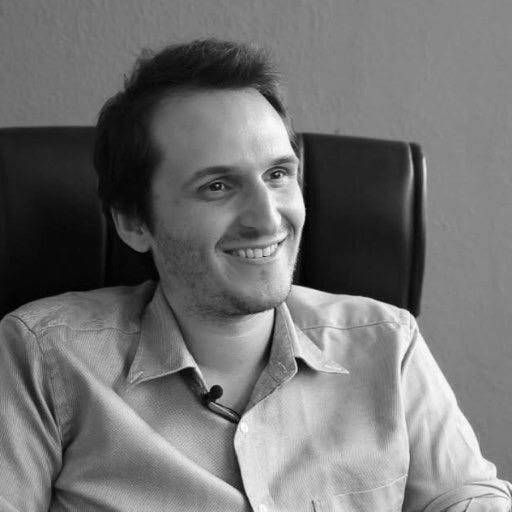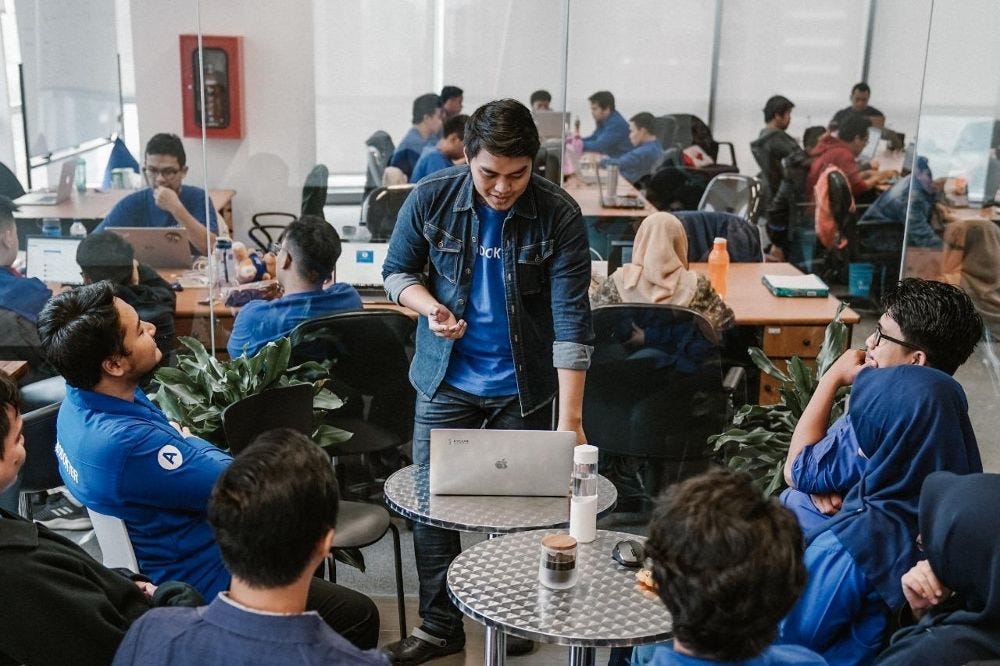05: Nathanael Faibis | Alodokter
Co-Founder at Alodokter | Building Better Healthcare Today, for Indonesians Tomorrow.
Ingredients for Success:
Start somewhere and own it. Entrepreneurs are naturally excited to tackle massive problems. This could lead to ‘analysis paralysis’ and work against the ability to execute. Nathanael focused on building content first as his beachhead market, and then leveraged the growing audience to move into tangential verticals.
Stick to the basics. Nathanael’s strength is his ability to look inwards and consistently cut out the noise. From product development, to culture building, to reacting to the competition, he’s made it a point to boil all initiatives down to one simple question: is this solving a key customer pain point? Less is more when riding through the chaotic journey of entrepreneurship.
Creative user acquisition strategy can be a moat. Being a platform business, Alodokter succumbed to the ‘chicken and egg’ problem of scaling. But, by creating two separate social networks – for doctors and patients – they were able to engage each customer actively, while connecting them seamlessly.
Living abroad is an exciting, adventurous experience. But it’s not easy. For Nathanael, starting a business as a foreigner in Indonesia stems from a multitude of experiences. “I asked myself: do I have skills that don't exist in the market? In 2014 when we launched, the combination of someone having technology and healthcare experience was fairly low, so I thought it was a good time to innovate in an underdeveloped industry. This, along with a personal incident that my wife faced, forms the foundation to why I started Alodokter.”
Content Is A Beachhead
“I was told that if she didn’t do the operation that very night, she wouldn’t be able to go to work anymore. It sounded serious,” says Nathanael, of his experience speaking to a doctor about his wife’s back problem. “We decided to get a second opinion, and the next doctor suggested that she does yoga.” The discrepancy in advice is a proxy for the state of Indonesia’s healthcare system at the time: a low trust, high-cost service. This incident, coupled with Nathanael’s stint in pharma research from working at Sanisphere, led him to look deeper into a potential opportunity in healthcare.
As he started to ideate on the business, Nathanael was immediately struck by the low quality of healthcare content available.
“Most of the information I found online was not fact based, and most sources conflicted with one another. Given the digitally native population in the country, it was clear to me that building a trustworthy content platform was a great first step.”
Just like that, Alodokter was born; that too, born in the right market. If there’s a way to describe the Indonesian consumer, it’s open-minded. “People in Indonesia are rarely skeptical to try new technologies; they’re always looking for new ways to do things. As a company, if you’re offering a better product and superior service, user traction comes quickly.” This comes as no surprise, given the rapid growth of the technology ecosystem in the country.
Aside from the ‘adventurous’ consumer, the healthcare industry in Indonesia is poised for a revamp. With an average 3% spend (as a % of GDP), healthcare is vastly underfunded in a rapidly developing region. This combination of a digitally-savvy consumer, with the low trust, underfunded healthcare sector, led Nathanael to believe that Alodokter was well-positioned to succeed.
What’s the Problem?
Product development to Nathanael is simple. It boils down to one question: what is the biggest pain point for our user? That’s it. “After we released our content platform, we soon realized that people want to speak to doctors. So, we launched our telemedicine service. For our insurance solution, there was a clear need, too. In Indonesia we had 2% insurance penetration, and in 50% of the cases expenses were paid out of pocket. So based on our users’ demands, we launched an insurance offering. In essence, we are being guided by consumers.”
Given the reliance Nathanael had on his users, I was curious about how engagement and retention are tracked. “Our marketing strategy for acquisition is less complex than you’d think. Honestly, for us, it’s always been about maintaining a high standard of service. We genuinely believe that if we treat our customers right and build a defensible product, our users will stick with us. We’ve seen marketing spend provide incremental benefits to us; what we really focus on is ensuring our users are happy.”
I couldn’t help but notice that this minimalist approach flows through to how Nathanael views Alodokter’s culture, too. For him, there are three key tenets of how the firm operates. “First, we are aware that healthcare is far from perfect and it’s our responsibility to make things better. This leads us to ensure that there is a ‘patient first’ mentality that runs across the company; everything major decision we make has to be engineered towards crafting a better customer experience. Second, our hiring process is skewed differently from other startups. Typically, early-stage companies are looking for young, eager people. But since we are in the healthcare business, we are driven to hire experts. We want to have people that bring unique points of view. Lastly, our culture is highly collaborative. We openly speak to how individual OKRs or KPIs don’t matter as much as the teams’. It’s like a football game - sure, one person can play well, but the main question is: did the team win the match?”
This highly simplified approach to building and scaling a company is in many ways, meditative. Nathanael is focused on boiling things down to the basics – be it product development, culture building, or user retention.
Clean Slate, Clear Path
Like Krishnan, being an outsider in Jakarta isn’t intimidating to Nathanael. “It’s important to understand that everyone lives in a bubble. Being a foreigner, I’m able to start from a clean slate and bring objectivity when solving a problem. All preconceived ideas are removed.”
This lack of inhibition drives Alodokter to think uniquely. A case in point is their customer acquisition and platform building strategy, which is one-of-a-kind. The ‘chicken and egg’ problem – a feature unique to all two-sided platform companies – was foundational for Alodokter when the firm was starting out. But, by creating two unique social networks – one for patients, and another for doctors – Nathanael leveraged creative thinking to create a more robust, cost-effective, and scalable go-to-market strategy.
Alodokter, which we’ve spoken to thus far, is the patient platform. Users log on to view content, connect with doctors, and order medicines. But, just as content is the key to Alodokter’s patient acquisition strategy, Alomedika is the bedrock of the acquisition tool for doctors. This unique platform, which acts as a ‘social network’ for doctors to engage, discuss, and build relationships, acts as a funnel to Alodokter’s patient pool. This two-sided social platform is a key ingredient to Alodokter’s ability to scale and succeed in such a short period of time.
Gone with the Wind
I’m always intrigued by how founders respond to competition. I think it says a lot about how they run their company. Some react in ways that depict cautious fear; they are constantly on the lookout, carefully strategizing and ensuring their product beats the opposition. Others, albeit aware of the competition, believe in focusing on the basics – sticking to what they know and having a thesis on how their product solves a sizable problem.
For Nathanael, he’s more of the latter.
“I’m not too worried about chasing market share. For us, it’s about creating new markets. We try to focus on ourselves, the culture we hope to sustain, the solutions we craft for user pain points, and the service we provide to our customers. That sums it up.”
This idea of ‘creating new markets’ and thinking creatively is almost necessary to succeed in Indonesia’s unique and developing market. For Alodokter, it’s certainly working. The business boasts 27 million monthly active users, which equates to around 10% of all Indonesians. More impressive is the 30,000 doctors registered on the platform (all thanks to the Alomedika strategy); for context, that’s 15% of all healthcare professionals in the country. And to sum it up, they have 1,500 hospital and clinic partners to support Alodokter’s mission.
Challenges aside, Nathanael has seized a massive opportunity, and taken the lead to provide more comprehensive, trustworthy, and high-quality healthcare to the people of Indonesia.
Check out www.akshaym.me for more writing.







